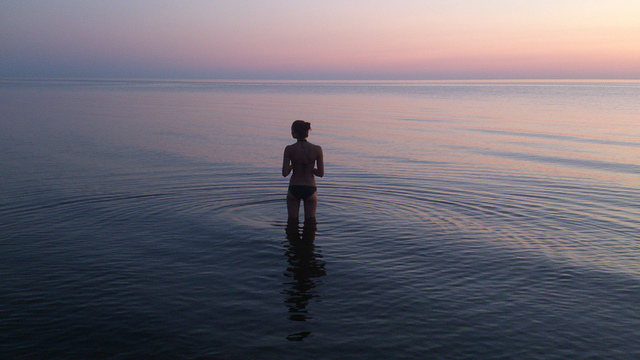Why is it that most of us are only able to love ourselves conditionally, while we automatically wrap other people and things in warm fuzzy blankets of unconditional love?
This question became crystal clear in my mind while laying in savasana at the end of yoga class yesterday. Our teacher suggested we think back to our intentions from the beginning of class and observe what else came up.
My brain started hitting me with a steady stream of words and intentions that started off being about me and how I’d like to feel. Then, at some point, my thoughts morphed into describing the ocean—one of my favorite things in the world.
Words like serene, calm and peaceful morphed into words like dark, turbulent and rough. And then I noticed something: Even when I thought of the ocean with those “negative” words, I didn’t feel any differently toward it. I still had a general feeling of reverence and respect for that big ol’ sea.
“How bizarre is that?” I thought (I know, thinking way too much for savasana time).
If I had described myself as being turbulent or rough, I would no doubt have a whole slew of judgements swirling around in my head, obsessing over how I can change myself to be less of those “bad” things.
But in the context of the ocean, I thought it was beautiful and amazing just the same. I’ve never stood on the shore, staring into an angry sea full of white caps getting whipped by the wind, and thought it was any less gorgeous than a crystal clear day when the water is still and filled with sparkles from the sun.
I started wondering why that is, and why it’s so incredibly hard to apply the same principles of non-attachment to myself.
If my emotions become turbulent, and I end up expressing them in a way that others can pick up on, I’ll worry incessantly after the fact about what I said and did and what others must surely be saying/thinking about me.
I have allowed myself to be so attached to the ways others see me, or how I think that they see me, that I end up throwing myself into a shame spiral for having feelings.
The funny thing is, there have been so many times when close friends or family have come to me asking if they came off as rude, or mad, or sad or (insert “bad” personality trait here), in a certain situation and I had been totally oblivious to what they were concerned about; or even if I had picked up on it, I forgot about it almost immediately and moved on to thinking about other things.
The people who truly know and love you look at you the way they look at the ocean. You may have times of turmoil when you’re whipping sand up in the air—but they see through that by knowing who you are at your core. Their unconditional love doesn’t disappear because of a short bout of less-than-ideal weather.
If we’re able to apply the same principles of non-attachment and unconditional love to ourselves, we can quickly move on from emotional rip tides as they happen. Even more importantly, this mindset gives us the perspective to observe and level-headedly deal with our emotions as they arise. That’s when emotions become something sacred instead of something to fear.
When our feelings turn into something sacred, we can have reverence for them. Whether we’re feeling serene, calm, turbulent or rough, it becomes second nature to love ourselves like the ocean—wholly, completely, and with unconditional respect.
Author: Casey Von Iderstein
Editor: Caroline Beaton
Image: Flickr











Read 1 comment and reply